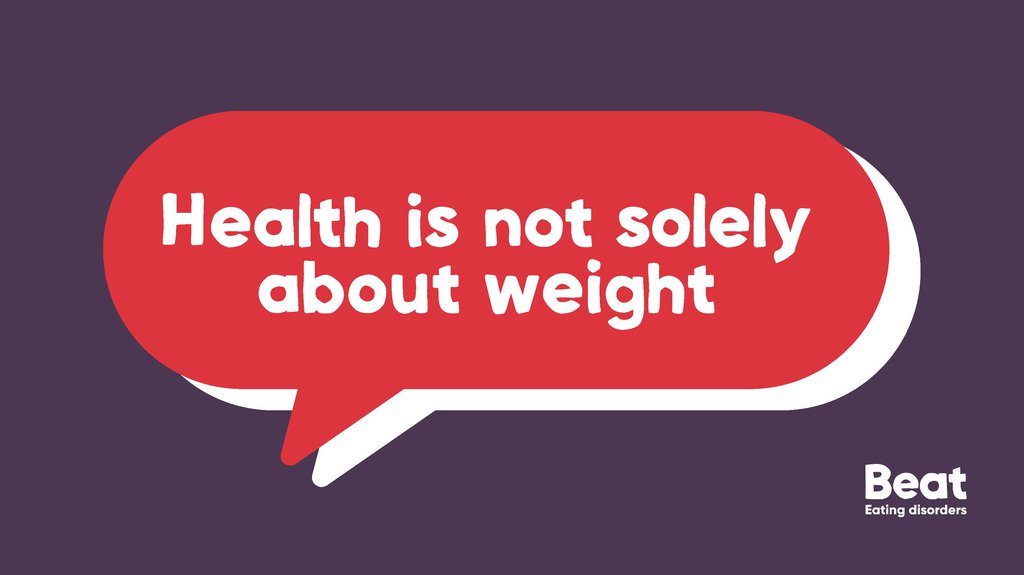Public Health Not Public Shaming

Obesity Strategy
In July 2020, the UK Government announced their strategy on obesity. This strategy included plans to:
- Introduce calorie labelling on menus in all restaurants, cafes and take-aways with over 250 employees
- Run a “Better Health” campaign, which includes a weight-loss app
- Introduce a new incentives and reward approach to encourage ‘eating better and moving more’
- Invest £70 million into weight management services
Previous Government public health campaigns have been ineffective in addressing obesity. They have also increased stigma, and have put those vulnerable to developing an eating disorder and those currently experiencing an eating disorder at risk.
As one eating disorder sufferer highlighted:
My eating disorder makes me, and many others, susceptible to taking these messages to the extreme.

Beat recognises the importance of addressing obesity, but it is vital that the public are not shamed into losing weight. This approach reduces people’s weight to a matter of individual choice and ignoring the many complex factors involved, which may include eating disorders.
“It made me feel like a criminal for being overweight and I sat in tears.”
This approach is not acceptable. Beat is calling on the Governments across the UK to take an integrated public health approach to obesity and eating disorders and to consult with experts from the field of eating disorders, including people with lived experience, in all campaigns and legislation to address obesity.
For more information on Beat’s response to the Government’s strategy on obesity, including our report outlining ways in which anti-obesity measures have the potential to cause distress to people at risk of developing an eating disorder and those already diagnosed, please see here.
Calorie Labelling on Menus
Beat has raised concerns about the introduction of mandatory calorie labelling on menus. Research shows that calorie labelling poses risks to people with eating disorders, whilst there is limited evidence that calorie labelling on menus will have its intended outcome. You can read our full report on this here.
Despite Beat’s concerns, the UK Parliament passed legislation introducing mandatory calorie labelling on menus in all restaurants, cafes and take-aways with over 250 employees in England, which came into effect from April 2022.
Beat are disappointed that this legislation has been introduced, despite the risks that it poses to people affected by eating disorders. We are however pleased that thanks to the fantastic work of Beat campaigners, 630 out of 650 MPs were informed about the risks of calorie labelling on menus as a result of our campaigners emailing their MPs about this issue. This has had a significant impact in raising awareness of the risks that campaigns to address obesity can pose to people with eating disorders, and during the last debate on the Obesity Strategy in the House of Commons, eating disorders were mentioned 41 times!
We are also pleased that due to the fantastic work of campaigners and experts from the field of eating disorders the Government has:
- Decided not to make calorie labelling mandatory in schools and other educational institutions.
- Allowed restaurants, cafes and take-aways to provide a menu without calorie information at the request of a customer.
However, there steps do not go far enough and Beat are continuing to call on the Government to do more to prevent people with eating disorders being put at risk by calorie labelling.
You can find our guidance on eating out with calorie labels on menus here.
What is happening in Scotland, Wales and Northern Ireland
The UK Government obesity strategy only directly affects England, although some larger establishments might start adding calorie labels on menus across the UK.
In Scotland, as part of the Diet and Healthy Weight Delivery Plan, the Government are considering the Out of Home Bill which will include calorie labelling on menus. You can get involved with our campaigning on this here.
In Wales the Government are considering calorie labelling as part of their Healthy Weight: Healthy Wales’ strategy. You can get involved with our campaigning on this here.
Mandatory calorie labelling isn’t currently being introduced in Northern Ireland. We will keep you updated if this changes, so opt in to our newsletter to receive our emails.
What next?
Beat will continue to call on Governments in the UK to take an approach to addressing obesity that is non-stigmatising, informed by evidence and does not harm people with eating disorders. After being contacted by Beat campaigners, a number of politicians pledged their support to the campaign. Though we couldn’t stop the legislation passing, we have raised so much awareness with so many MPs, so it’s an important time to let them know more about the many other difficulties faced by those with eating disorders, including the unacceptably long waits faced for treatment.
Contacting your representative in Parliament to let them know how strongly you feel about this is the next important step to get our voices heard up and down the UK. You can contact your MP by sending them an email drawing their attention to the need to improve access to treatment for people with eating disorders. With the pandemic, and the introduction of calorie labelling in larger restaurants, cafes and take-aways this is more important than ever.
Take action
Advice for Eating Out with Calorie Labelling
From April 2022, new laws in England will mean many businesses that serve food will have to put information about calorie content on their menus.
We know that many people with eating disorders will find this calorie labelling on menus makes an already challenging situation harder, so we’ve put together some guidance to support you with dining out when the new laws come into effect in April 2022.